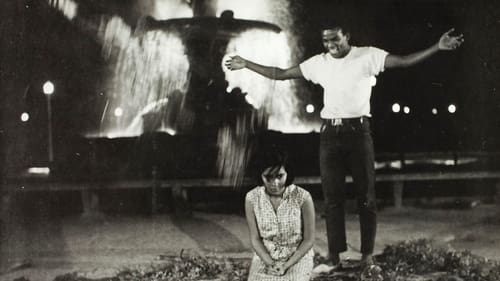Zé Keti
출생 : 1921-10-06, Rio de Janeiro, Rio de Janeiro, Brazil
사망 : 1999-11-14
약력
Zé Keti (born José Flores de Jesus) was a Brazilian samba singer and songwriter. He appeared as an actor in a few Cinema Novo (Brazilian New Cinema) films. His life up to the 1950s served as an inspiration for the Nelson Pereira dos Santos film "Rio, Zona Norte".

Follows the story of Opinião, a theatre group created in 1964 during the early Brazilian dictatorship period to oppose the government through artistic performances. Considered the first left-wing response to the dictatorship, the group gathered now famous Brazilian artists such as Nara Leão, Maria Bethânia, João do Vale and Millôr Fernandes.

Self

Music
Short musical film paying a tribute to samba composer Zé Ketti, one of the greatest popular artists of Brazilian music. In a jam session, in the late composer's house in Inhaúma, a neighborhood of Rio de Janeiro, a group of friends get together to play his music while a "feijoada" (typical Brazilian food with black beans)is being cooked in the kitchen. The samba-players, first-rate samba stars themselves, remember Ketti's great hits in a homage to the man who was best known as "a voz do morro" ("the hill's voice" - but hill as a metaphor for a place where poor people build their shacks in slums, in opposition to city, where middle-class people live in Rio). Among the guests, names of the traditional "samba-school" Portela and ex-partners. Also, the presence of a black hat on an empty chair, represents the composer himself, who died in 1999, after a life of many accomplishments in music, and appearance in three of Dos Santos's films: "Rio, 40 Graus", "Rio Zona Norte" and "Boca de Ouro".

Samba Dancer

Original Music Composer
In search of a better life, Luzia leaves the Northeast of Brazil and goes to Rio de Janeiro, looking for her fiance who went first to pave their way. Alone in the Marvelous City, she is forced to accept the friendship and protection of Calunga and, later, the company of Inácio.

Compositor
In search of a better life, Luzia leaves the Northeast of Brazil and goes to Rio de Janeiro, looking for her fiance who went first to pave their way. Alone in the Marvelous City, she is forced to accept the friendship and protection of Calunga and, later, the company of Inácio.

After visiting a fortune teller, Zulmira is informed that a blonde woman will threaten her peace. After talking to her husband Toninho, she suspects that her cousin Glorinha may be that blonde. In poor health, Zulmira makes all the preparations for the day of her death and asks her unemployed husband to deal with the costs of the coffin and funeral with a man named João Guimarães Pimentel. What Tom doesn't know is that Zulmira and this man hide some secrets that he could never imagine.

Passively facing the repression imposed by military dictatorship in Brazil in the 60s, a journalist gets into a personal crisis, aggravated by his love affair with an industrialist's wife, who doesn't want to leave her home because of her son

프랑스의 한 박물관에서 말타 문명의 조각상이 도난 당하는 사건이 발생한다. 원래 이 조각상은 3개가 한 세트인데, 이 조각상을 발견한 고고학자와 수집가가 각각 소유하고 있던 것이다. 여주인공 아그네스가 고고학자였던 아버지의 유언으로 조각상 하나의 행방을 알고 있었고, 그녀는 박물관에서 조각상을 훔쳤던 집단에 의해 납치를 당한다. 이때 마침 휴가를 나온 아그네스의 약혼자이자 공군 파일롯인 애드리안 (장 폴 벨몽도)가 아그네스를 쫓아 그녀가 납치된 브라질의 리오에서 모험을 펼친다는 내용이다.


For his first in a long series of wildly imaginative literary adaptations, dos Santos reinvented Nelson Rodrigues' novel about a pathological gangster with solid gold teeth and a voracious appetite for women and power. Embracing radically modernist narrative techniques, Golden Mouth offers a splintered, refractive portrait of brutal masculinity that returns repeatedly to the same moment from different vantages, each time revealing unexpected perspectives on the brutal yet strangely charming criminal. Lurid and disturbing, Golden Mouth delivers a savage satire of marriage and class pretensions, revealing a similar venality at the corroded heart of the sanctimonious bourgeoisie, the moneyed elite and the working class as they all mercilessly claw their way up and down the rickety and ruthlessly hierarchical Brazilian social ladder. -Harvard Film Archive

Music
On the day of his wedding, young man from a family of immigrants faces some problems to get the money needed for the last arrangements. The family do what they can in order to honour the great event, selling personal belongings and buying enough supplies for a decent party.

Music
A talented songwriter of sambas is forced to face the social injustices of the city around him.

Alaor Costa
A talented songwriter of sambas is forced to face the social injustices of the city around him.

Banned by Brazil’s Federal Department of Public Safety, Rio, 40 Graus is a landmark film that ushered in the wave of Cinema Novo in Brazil. The film chronicles a day in the life of five peanut vendors from Rio de Janeiro's favelas. This was one of the first Brazilian films to address the issues of race, poverty, and class.

Original Music Composer
Banned by Brazil’s Federal Department of Public Safety, Rio, 40 Graus is a landmark film that ushered in the wave of Cinema Novo in Brazil. The film chronicles a day in the life of five peanut vendors from Rio de Janeiro's favelas. This was one of the first Brazilian films to address the issues of race, poverty, and class.










